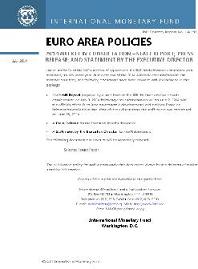International Monetary Fund (2014) “Euro Area Policies Staff Report for the 2014 Article IV Consultation With Member Countries“, IMF Country Report No. 14/198, Ιούλιος. KEY ISSUES Context. Real output has expanded for four consecutive quarters, and financial market sentiment has improved markedly. But the recovery is weak and uneven. Inflation has been too low for too long, financial markets are still fragmented, and structural gaps persist: these hinder rebalancing …Read More
Lower import prices = 100% welfare gains? Not necessarily: don′t forget the impact of consumer taste and product quality
Benkovskis, K. & Woerz, J. (2014) “Lower import prices = 100% welfare gains? Not necessarily: don′t forget the impact of consumer taste and product quality“, VoxEU Organisation, 15 Ιουλίου. Import price statistics may not be a reliable indicator of welfare gains. They must adequately reflect the fact that consumers value variety, and that consumer tastes and product quality change over time. This column evaluates existing findings, and introduces new …Read More
Has the Great Recession killed the traditional Phillips Curve?
Wren-Lewis, S. (2014) “Has the Great Recession killed the traditional Phillips Curve?“, Mainly Macro Blog, 14 Ιουλίου. Before the New Classical revolution there was the Friedman/Phelps Phillips Curve (FPPC), which said that current inflation depended on some measure of the output/unemployment gap and the expected value of current inflation (with a unit coefficient). Expectations of inflation were modelled as some function of past inflation (e.g. adaptive expectations) – at …Read More
European Wage Depression Since 1999
Janssen, R. (2014) “European Wage Depression Since 1999“, Social Europe Journal, 30 Μαΐου. Probably one of the most popular slogans of the entire European Semester is the catchphrase that wages should be aligned with productivity. The reason for its popularity is that this phrase can be used with a lot of flexibility. On the one hand, the Commission can make use of it to discipline wages and undermine national …Read More
Managing the Euro Area Debt Crisis
Cline, R. W. (2014) Managing the Euro Area Debt Crisis, Washington: Peterson Institute for International Economics, Ιούνιος. First came the financial and debt crisis in Greece, then government financing difficulties and rescue programs in Ireland in 2010 and Portugal in 2011. Before long, Italy and Spain were engulfed by financial contagion as well. Finally in 2012, the European Central Bank pledged to do “whatever it takes” to preserve the …Read More
Let’s get to Work! The Future of Labour in Europe
Beblavý, Μ., Maselli, Ι. & Veselkova, Μ. (2014) “Let’s get to Work! The Future of Labour in Europe“, Economic Policy, CEPS Paperbacks, 10 Ιουλίου. Work is both an essential part of our daily lives and one of the major policy concerns across Europe. Yet the public debate of labour issues is all too often driven by political rhetoric and short-term concerns. In this volume, researchers from seven European countries …Read More
Europe between financial repression and regulatory capture
Pagliari, S., Vallée, S. & Monnet, E. (2014) “Europe between financial repression and regulatory capture“, Working Paper 2014/08, Bruegel Think Tank, 10 Ιουλίου. The financial crisis modified drastically and rapidly the European financial system’s political economy, with the emergence of two competing narratives. First, government agencies are frequently described as being at the mercy of the financial sector, routinely hijacking political, regulatory and supervisory processes, a trend often referred …Read More
Banks, Government Bonds, and Default: What do the Data Say?
Gennaioli, Ν., Martin, Α. & Rossi, S. (2014) “Banks, Government Bonds, and Default: What do the Data Say?“, IMF Working Paper No. 14/120, 08 Ιουλίου. We analyze holdings of public bonds by over 20,000 banks in 191 countries, and the role of these bonds in 20 sovereign defaults over 1998-2012. Banks hold many public bonds (on average 9% of their assets), particularly in less financially-developed countries. During sovereign defaults, …Read More
84th BIS Annual Report, 2013/2014
Bank for International Settlements (2014) 84th BIS Annual Report, 2013/2014, BIS Publications, 29 Ιουνίου. A new policy compass is needed to help the global economy step out of the shadow of the Great Financial Crisis. This will involve adjustments to the current policy mix and to policy frameworks with the aim of restoring sustainable and balanced economic growth. The global economy has shown encouraging signs over the past year …Read More
Lessons from history for the European Financial Crisis
Sayek, S. & Taskin, F. (2014) “Lessons from history for the European Financial Crisis“, VoxEU Organisation, 05 Ιουλίου. The European Monetary Union is unprecedented, but the Eurozone Crisis is not. This column draws upon the experiences of previous banking crises, and compares the Eurozone Crisis countries. Like Japan before the 1992 crisis, Spain and Ireland had property bubbles fuelled by domestic credit. The Greek crisis is very distinct from …Read More








